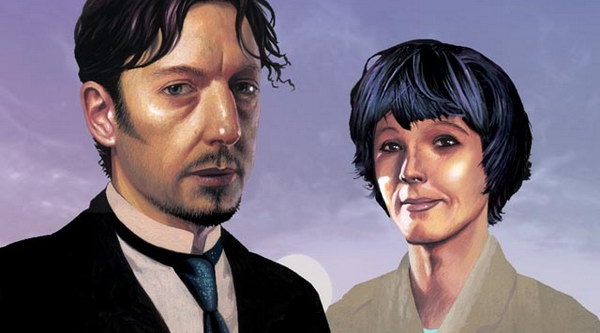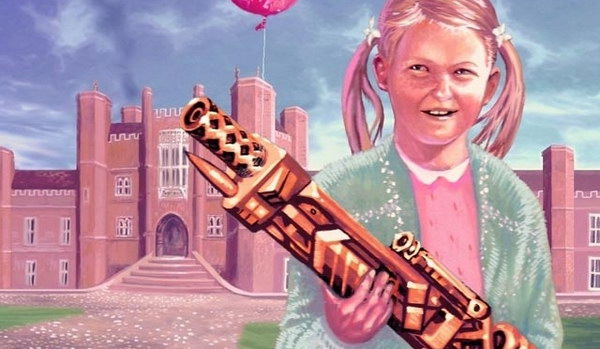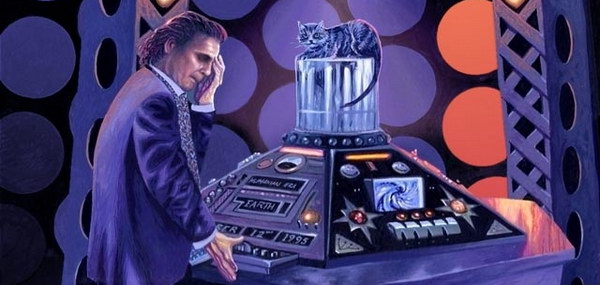|
| |
|
STORY PLACEMENT THIS STORY TAKES PLACE BETWEEN THE NOVEL "SANCTUARY" AND THE BIG FINISH AUDIO BOOK "BERNICE SUMMERFIELD AND THE CRIMINAL CODE."
WRITTEN BY PAUL CORNELL
RECOMMENDED PURCHASE OFFICIAL VIRGIN 'NEW ADVENTURE' PAPERBACK (ISBN 0-426-20443-3) RELEASED IN MAY 1995.
BLURB April, 1914.
The inhabitants of Farringham are enjoying an early summer, unaware that war is on the way. Amongst them is Dr John smith, a short, middle-aged history teacher from Aberdeen. He's having a hard time with his new post as housemaster at Hulton Academy, a school dedicated to producing military
officers. her holiday in the town, getting over the terrible events that befell her in France. But then she meets a Doctor FROM THE FUTURE, and VERY QUICKLY things start to get dangerous.
With the Doctor she knows gone, and only a suffragette and an elderly rake for company, can Benny fight off a vicious alien attack? And will Smith be able to save the day? |
|
|
Human Nature MAY 1995
The Latin “Maius intra qua extra” translates as ‘bigger on the inside than the outside’, apparently – sentiments that could certainly be applied to this fine novel. In the expanded universe of Doctor Who literature, Human Nature is the literary equivalent of a television serial like The Caves of Androzani or The Talons of Weng-Chiang. Even those who don’t consider it to be the best, generally accept that it’s there or thereabouts.
And just as Human Nature is widely accepted as being one of the best Who novels, its writer Paul Cornell is almost universally acknowledged as one of the best Who novelists. He’s an immensely talented and imaginative writer, and has a wonderful knack of taking some often quite heavy subject matter and making it palatable. Not protracted or verbose, Cornell’s pages of beautifully concise prose just fly by.
After his epic conclusion to the New Adventures’ ‘alternate universe’ arc of stories, Cornell has opted to go in a completely different direction with this book. Human Nature may lack a lot of the punch that his last two novels have had, but it more than makes up this in how it explores the Doctor’s character. In his 1991 debut novel, Timewyrm: Revelation, Cornell took Ace on a journey inside the Doctor’s head that examined his neuroses in great detail. Here, the author once again looks at the Doctor’s anguish, but this time from a different angle. By the time of Human Nature, the Doctor is old. Even just the seventh Doctor is old - since his last regeneration he’s had so, so many adventures and suffered so much grief and pain, and so in this book he looks to leave all that behind. He gives it all up to be human.
“He’s like me, only inhuman. Dangerous. Loves greatly, but not small-ly. He’s Merlin.”
The Doctor transforms himself both physically and mentally into a human being. He has one heart; a heart capable of loving. Now this book could really have been a disaster area in the hands of another author. The Doctor? Love! How dare they make him fall in love! One can imagine the furore. But this is not the Doctor. The Doctor can’t love - not in that way, anyway – and that’s the whole point. That’s why he wanted to be human. That’s why he created ‘Dr John Smith’, the schoolteacher. To experience human life and human emotions.
And initially, that’s exactly what he does. It’s delightful to read about Smith’s charming but humble existence and the simple pleasures that he takes from his life. He’s not perfect and he makes mistakes – at times, as the reader, you’re thinking “c’mon Doctor, you bloody sell-out, do something!” or cringing as he spouts propaganda to young Tim. It’s only as the novel progresses that you realise that despite his eccentricity, Smith is a completely different and separate entity, and when faced with the prospect of becoming the cold and calculating Lord of Time again it isn’t surprising that he doesn’t seem over-keen on the idea.
or at least Benny thinks so. In her many scenes with Benny, Joan comes across as being stuck-up; even quite pompous and patronising at times. However, in her scenes with Smith she is a different woman all together. Lonely, vulnerable, and caring. In fact, her only true vice is her apparent racism, though bearing in mind that this novel is set in the months leading up to the Great War, she can hardly be blamed for it. Like many half-sympathetic characters in Mark Gatiss’ brilliant novel, Nightshade, and Ben Aaronovitch’s outstanding television serial, Remembrance of the Daleks, racism has simply been drummed into them since birth. They just don’t know any better.
Benny herself is also handled superbly by her creator, as always. Sanctuary was a hard act to follow, but Cornell pulls it off wonderfully, immersing Benny in the completely alien culture of England, 1914. As with her escapades in Birthright, Benny finds it incredibly difficult to adjust to human beings that seem, well… primitive. Society’s attitudes towards gender, war, race, and even homosexuality all rear their heads at some point to rile her. I particularly like her sub-plot featuring the character of Alexander and the harrowing news from the future that she inadvertently brings to him.
Cornell also evokes the atmosphere of 1914 superbly. Of course, it’s impossible for me to say that definitively not having lived back then, but I have read a lot about the period and likewise, the author seems to have really done his homework. Aside from the setting and the period touches, the schoolboys are particularly well-drawn – some, like Hutchinson and Merryweather, are portrayed as bullies; military idiots. Others, like Tim and Anand are much smaller and quieter – the abused. There are some nasty scenes of torment here, culminating in a horrific act of brutality that I really didn’t see coming.
The one element of Human Nature that often seems to be criticised by fandom is its alien threat – the Aubertides. They are a strange and a sick bunch, unified by their bloodline and their desire to become Time Lords – “because there’s nothing else to do”. I understand that after No Future, Cornell didn’t want to write about another big super villain – he just wanted a little gang of rogues; a nasty little group that would cause some trouble, but not detract from the book’s central theme of the Doctor’s character. Well, that’s exactly what he wrote, though that’s certainly not to say that there’s any shortage of action here - practically half the book is schoolboys fighting Aubertides with machine guns!
There’s also quite a lot of continuity crammed into the story, which is great when you’re reading the novel as part of the New Adventures series, but as a stand-alone novel I don’t think Human Nature would works anywhere near as well. If the reader isn’t familiar with the Doctor’s recent experiences, they won’t be able to understand why he would want to make himself human and, perhaps more importantly, the reader really needs to be familiar with at least Love and War to fully understand the story’s end, where Death comes to take Smith as part of the bargain that the Doctor made with her in that book. Even from Benny’s point of view, these events follow on directly from the bereavement she suffered at the end of the previous novel, Sanctuary, and many of the early chapters (delightfully written as her entries in her infamous diary!) deal explicitly with her loss. One particular in-joke really did make me cringe though – Mr Moffat, the curly-haired Scottish bursar, sounds suspiciously like a writer-friend of Cornell's to me, who just happened to pen Smith’s children stories for this book…
All in all, Human Nature is a watershed story for the New Adventures in lots of ways, and if Virgin were ever going to regenerate the seventh Doctor than this would have been the perfect swansong for him. Long before the TV Movie put forward the notion that the Doctor is half-human, Human Nature took the bull by the horns and showed us what would happen
if the Doctor were to become fully human,
affording us a rare
glimpse of the his personal hopes and fears, and, even more importantly,
re-affirming exactly what it means to be the Doctor.
|
|
|
Copyright © E.G. Wolverson 2006
E.G. Wolverson has asserted his right under the Copyright, Designs and Patents Act, 1988 to be identified as the author of this work. |
|
|
Quite astonishingly, and no doubt contrary to authorial intent, the events of this adventure can be reconciled with the events of the later television adaptation. This is because this story takes place in April 1914, several months after the tenth Doctor’s escapades. However, this theory admittedly relies on one being prepared to accept that the Doctor could enjoy two suspiciously similar adventures with suspiciously similar protagonists and then forget all about the earlier one, but we’ve made bigger leaps...
|
|
|
Unless otherwise stated, all images on this site are copyrighted to the BBC and are used solely for promotional purposes. ‘Doctor Who’ is copyright © by the BBC. No copyright infringement is intended. |
|

.jpg)
.jpg)
.jpg)
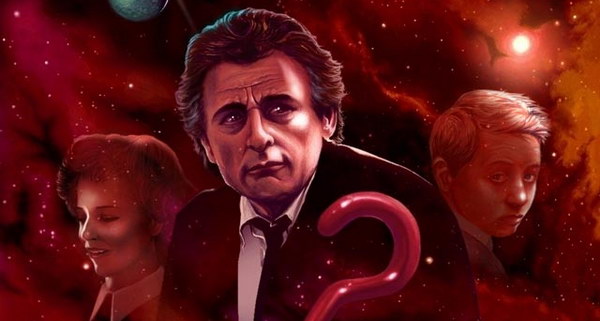
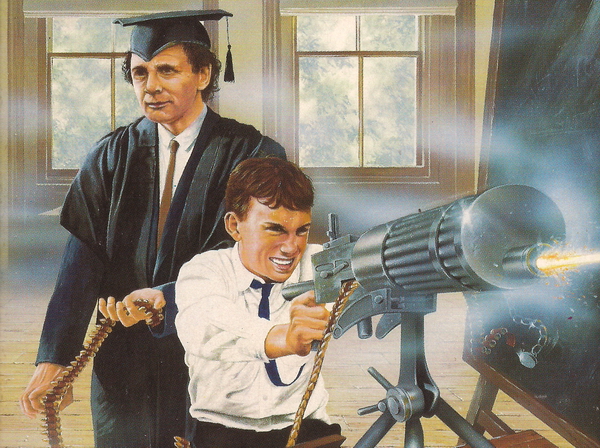
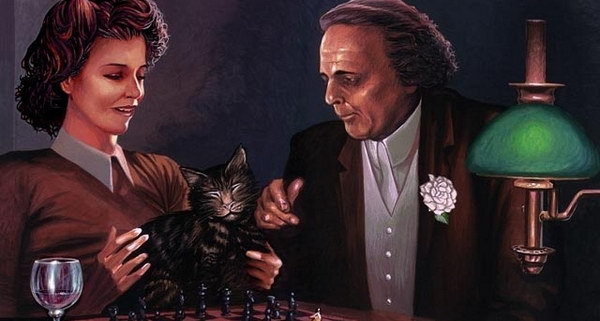
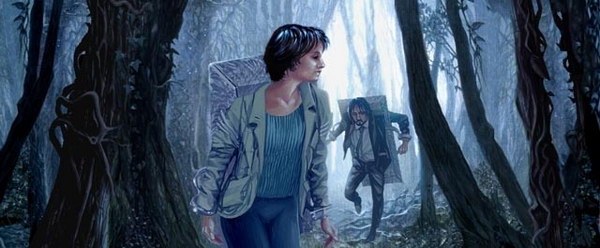
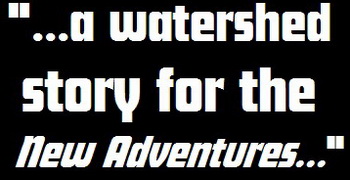 Even
Smith’s choice of lover is dubious,
Even
Smith’s choice of lover is dubious,
